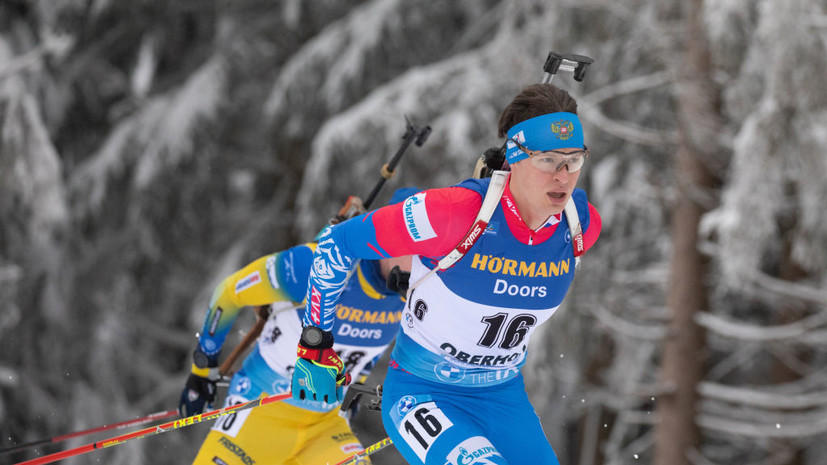The sixth stage of the Biathlon World Cup has started in Oberhof, Germany.
The first medals were played in the men's sprint.
The leader of the overall standings, the Norwegian Johannes Boe won, ahead of compatriot Sturla Legrade and German Arnd Peiffer.
All three race winners showed clean shooting.
The best in the Russian national team was Matvey Eliseev, who took tenth place.
On the eve of the race, it became known about the rotation in the Russian national team.
Anton Babikov was replaced by the five-time world champion among juniors Igor Malinovsky.
Babikov's current season did not work out - although he shot quite consistently and worked twice as zero, he never started running at the level of world leaders or at least his teammates.
In seven personal races, Babikov scored only 21 points in the World Cup standings.
The patience of the coaching staff snapped after 74th place in the sprint at the first stage in Oberhof.
As a result, Malinovsky got the chance to make his debut this season and perform in the sprint under the last, 101st number.
The main favorites of the race started in the third ten or later.
Of the Russians, only Evgeny Garanichev got into the first group of participants.
In the last sprint, he shot excellent prone, but then made three misses on the stand.
This time, he immediately started with a mistake at the first shooting range and began to lose more than 20 seconds even to the Moldovan Pavel Magazeev, who had represented Russia in the past.
But on the counter, Garanichev corrected himself and closed all the targets.
For some time he even kept in the top three, but only until the main contenders for medals entered the fight.
Among them were the owners of gold medals in the mixed relay Eduard Latypov and Alexander Loginov.
On the third day after their victory, they still ran the distance just as well - Loginov shared the lead with the Swede Martin Ponsiluoma in the 800-meter cutoff, and Latypov approached the first shooting line with a fifth time.
But they were equally unsuccessful in lying.
Both Russians missed the last shot.
As a result, Latypov began to lose almost 18 seconds to Sturla Legraid from Norway who was walking first, and Loginov's gap exceeded 36 seconds.
By the time the Russian biathletes began to shoot while standing, their loss increased by a few more seconds, as the lead was intercepted first by the Italian Lucas Hofer, and then by the Norwegian Johannes Boe.
The stand for Latypov and Loginov also turned out to be a simpler test than lying down.
Thanks to clean shooting, Latypov even managed to rise to fifth place, symbolically lagging behind the Latvian Andrei Rastorguev.
Loginov ran slower and ended up in the second ten.
But on the other hand, he walked the last circle almost on the same foot as Legrade, and Latypov did not retain his strength for the final third of the distance.
He lost to the Norwegian 20 seconds in 2.5 km and did not even get into the top ten - Ponsiluoma and Hofer, who missed twice, turned out to be higher.
After the finish of Be-junior, Latypov dropped to 13th place, and Loginov - to 16th.
Kirill Streltsov was the next to enter the race.
He was immediately able to please with clean prone shooting and ran the first lap faster than Latypov by one and a half seconds.
But the young athlete was not the best in the Russian national team for long - Matvey Eliseev started even faster and also closed all the targets.
He moved up to ninth place, 15 seconds behind Johannes Boo.
At the counter, Streltsov did not work so confidently - another miss with the last shot threw him behind Garanichev, who by that time was already teetering on the verge of relegation from the spectacle zone.
Eliseev was able to close all the targets for the second time in a row.
He broke into the top five, and only seven seconds separated him from the prize position.
Russian biathletes have not been so close to medals in individual races this season.
Unfortunately, Eliseev was unable to maintain his pace on the last loop.
Although he fled with all his strength, he had to drop to tenth place and be behind five athletes at once who were not as accurate on the shooting range.
Nevertheless, for Eliseev, this result was the best of the season.
Streltsov performed the final third of the distance much better.
He managed to win back nine positions and close the top 30, being 14 lines higher than Garanichev in the final protocol.
With this, the 24-year-old biathlete showed how much he wanted to get into the relay four, which will compete for medals on January 15.
Taking into account the fact that Eliseev, Latypov (15th place), Loginov (21st place) and Streltsov made only three misses for four, they will have chances for medals in the team race.
As for Malinovsky, his return to the national team was a failure.
He missed one target at each shooting range and finished only 92nd, losing more than four minutes to Johannes Boe.
It is very likely that the team will soon be replaced by Babikov or someone else from the nearest reserve.
All three men on the podium with the perfect 10/10 at the range!
# obe21 👏
🥇🇳🇴 Johannes Thingnes Boe @NSSF_Biathlon
🥈🇳🇴 Sturla Holm Laegreid @NSSF_Biathlon
🥉🇩🇪 Arnd Peiffer @skiverbandhttps: //t.co/bk5aBBso9Qpic.twitter.com/fFv5BXSl7T
- IBU World Cup (@IBU_WC) January 13, 2021

